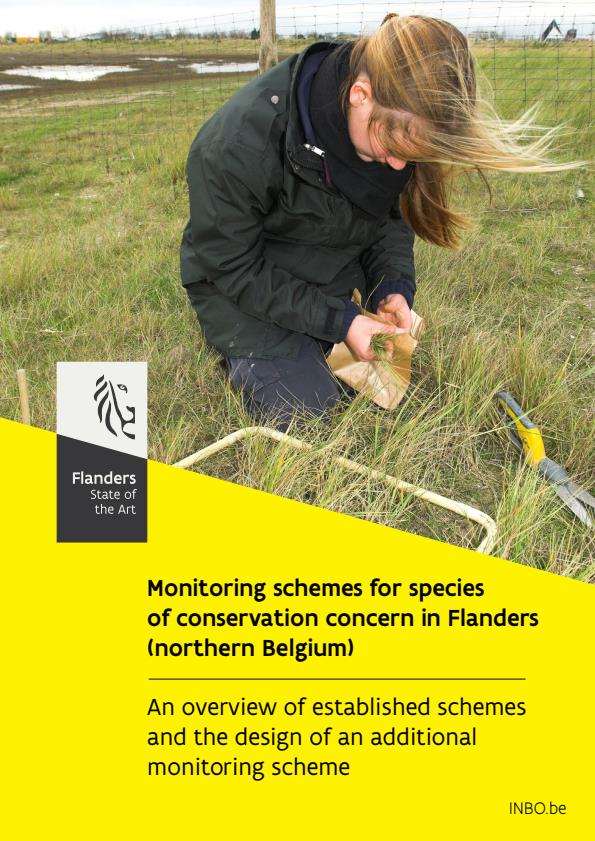Monitoring schemes for species of conservation concern in Flanders (northern Belgium). An overview of existing schemes and the design of a new scheme
For the 69 species that dropped out at the time, INBO, in collaboration with ANB and Natuurpunt Studie, started a new monitoring program in 2016: meetnetten.be. An important criterion for these new monitoring networks is applicability/feasibility by trained citizen scientists.
In this report, we first give an overview of the existing monitoring networks in Flanders. Then we present the methodology we used to build scientifically based monitoring networks for the missing species.
We are now examining to what extent new monitoring techniques can be integrated into the monitoring networks for species that are difficult to monitor. These could include environmental DNA (eDNA) and other molecular identification methods (e.g. metabarcoding), automated species detection using cameras, pheromones, sniffer dogs, etc. The way we designed new monitoring schemes for policy-relevant species in Flanders can serve as an example for other countries and regions.
Details
| Number of pages | 111 |
|---|---|
| Type | Reports of Research Institute for Nature and Forest |
| Category | Research |
| Language | Dutch |
Bibtex
@misc{282dadda-7fd1-4685-a75b-ad6a1d20c55f,
title = "Monitoring schemes for species of conservation concern in Flanders (northern Belgium). An overview of existing schemes and the design of a new scheme",
abstract = "In Flanders, 14 monitoring programs are up and running, following 8 species groups: amphibians, breeding birds, waterbirds, diurnal and nocturnal butterflies, mammals, bats, fish and vascular plants. However, an analysis showed that the existing monitoring networks are far from monitoring all European Bird and Habitat Directive species and Flemish priority species.
For the 69 species that dropped out at the time, INBO, in collaboration with ANB and Natuurpunt Studie, started a new monitoring program in 2016: meetnetten.be. An important criterion for these new monitoring networks is applicability/feasibility by trained citizen scientists.
In this report, we first give an overview of the existing monitoring networks in Flanders. Then we present the methodology we used to build scientifically based monitoring networks for the missing species.
We are now examining to what extent new monitoring techniques can be integrated into the monitoring networks for species that are difficult to monitor. These could include environmental DNA (eDNA) and other molecular identification methods (e.g. metabarcoding), automated species detection using cameras, pheromones, sniffer dogs, etc. The way we designed new monitoring schemes for policy-relevant species in Flanders can serve as an example for other countries and regions.",
author = "Dirk Maes and Frederic Piesschaert and Hannes Ledegen and Sam Van De Poel and Tim Adriaens and Anny Anselin and Claude Belpaire and Jan Breine and Dimitri Brosens and Rein Brys and Luc De Bruyn and Kris Decleer and Geert De Knijf and Koenraad Devos and Gerald Driessens and Simon Feys and Jan Gouwy and Ralf Gyselings and Marc Herremans and Ilf Jacobs and Iwan Lewylle and An Leyssen and Gerald Louette and Thierry Onkelinx and Jo Packet and Sam Provoost and Paul Quataert and Sanne Ruyts and Thomas Scheppers and Jeroen Speybroeck and Roosmarijn Steeman and Eric Stienen and Arno Thomaes and Koen Van Den Berge and Koen Van Keer and Wouter Van Landuyt and Gerlinde Van Thuyne and Wim Veraghtert and Dominique Verbelen and Goedele Verbeylen and Glenn Vermeersch and Toon Westra and Marc Pollet",
year = "2023",
month = jan,
day = "01",
doi = "https://doi.org/10.21436/inbor.93332112",
language = "English",
publisher = "Instituut voor Natuur- en Bosonderzoek",
address = "Belgium,
type = "Other"
}
Authors
Dirk MaesFrederic Piesschaert
Hannes Ledegen
Sam Van De Poel
Tim Adriaens
Anny Anselin
Claude Belpaire
Jan Breine
Dimitri Brosens
Rein Brys
Luc De Bruyn
Kris Decleer
Geert De Knijf
Koen Devos
Gerald Driessens
Simon Feys
Jan Gouwy
Ralf Gyselings
Marc Herremans
Ilf Jacobs
Iwan Lewylle
An Leyssen
Gerald Louette
Thierry Onkelinx
Jo Packet
Sam Provoost
Paul Quataert
Sanne Ruyts
Thomas Scheppers
Jeroen Speybroeck
Roosmarijn Steeman
Eric Stienen
Arno Thomaes
Koen Van Den Berge
Koen Van Keer
Wouter Van Landuyt
Gerlinde Van Thuyne
Wim Veraghtert
Dominique Verbelen
Goedele Verbeylen
Glenn Vermeersch
Toon Westra
Marc Pollet

